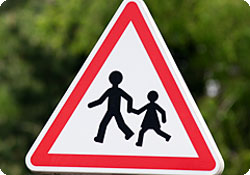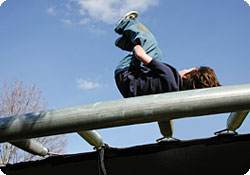FEATURE ARTICLE -
Issue 32 Articles, Issue 32: Dec 2008
Facts
The Plaintiff was 8 years old when, in 1989, he was a member of a Tae Kwon Do class at a local hall in Townsville. The class, including the Plaintiff, was taken on a run by one Dobie at 7:30pm when the Plaintiff was struck and severely injured by a vehicle driven by Hill and insured by Suncorp. Dobie died in 2001, 6 years before the trial. The Plaintiff’s action for damages proceeded to trial only against Hill, Suncorp and Mr Ivanov, who the Plaintiff claimed was the owner and operator of the Tae Kwon Do Academy.
 In December 2006, Ivanov applied to the Townsville Supreme Court in an interlocutory application to have the admission in his defence that he was the owner and operator of the Academy withdrawn. That application was unsuccessful.
In December 2006, Ivanov applied to the Townsville Supreme Court in an interlocutory application to have the admission in his defence that he was the owner and operator of the Academy withdrawn. That application was unsuccessful.
In August 2007, the matter went to trial. The learned trial judge2 found that Hill’s failure to slow down and/or sound his horn as he approached the Plaintiff and the other members of the group was negligent and a cause of the Plaintiff’s injuries. His Honour also found that because of the admission in the pleadings that Ivanov was the owner and operator of the Academy, he was the person with ultimate responsibility for the conduct of the class. Whilst the Plaintiff did not make out a case that Ivanov employed Dobie, he was entitled to rely on Ivanov’s breach of a non-delegable duty as the person ultimately responsible for the safe conduct of the class and that he had failed to ensure that reasonable care was exercised in the performance of the activities involved in the classes. The learned trial judge ordered Ivanov to pay one-half of the judgment sum which exceeded $730,000.00 plus costs. Ivanov appealed against the judgment.
The Issues on Appeal
At the appeal, Ivanov sought leave to obtain an extension of time to appeal against the interlocutory order refusing leave to withdraw the admission.He also appealed against the learned trial judge’s findings of a non-delegable duty.
The application for an extension of time to appeal against the interlocutory order was refused on the basis that there was no justification to excuse the significant delay from the date of the application. In any event, it was held that there was no error made in that exercise of discretion. The primary focus of the appeal was on Ivanov’s argument that he did not owe the Plaintiff a non-delegable duty of care.
The Trial Judge’s Findings
At the trial, His Honour found that Ivanov, as owner and operator of the class, owed a non-delegable duty to those enrolled in the class to provide reasonable care to protect them from harm. This was in spite of the fact that a non-delegable duty of care was not specifically pleaded. His Honour referred to the principles set out in Introvigne3 and Kondis v. State Transport Authority4 and determined that the situation was analogous to the duty owed by a school to its pupils.
 Ivanov conceded in evidence that he would not have acted as Dobie did in not gathering all the students together to cross the road as one group under the direction of the instructor and that taking children as young as 8 for a run along the side of a road at dusk in a class of 10 or 12 students, was unsafe. Based on this and other evidence, he found that Ivanov had failed to ensure that reasonable care was taken in the performance of activities associated with the classes and was therefore liable.
Ivanov conceded in evidence that he would not have acted as Dobie did in not gathering all the students together to cross the road as one group under the direction of the instructor and that taking children as young as 8 for a run along the side of a road at dusk in a class of 10 or 12 students, was unsafe. Based on this and other evidence, he found that Ivanov had failed to ensure that reasonable care was taken in the performance of activities associated with the classes and was therefore liable.
The Decision of the Court of Appeal
The leading judgment was written by the President5. Her Honour traced the law relating to non-delegable duty of care. Reference was made to Ramsay v. Larsen6, a case involving a 12 year old student injured when he fell out of a tree at the state school he attended. Kitto J’s analysis of the case has provided the Australian source for the tortious concept of breach of a non-delegable duty of care. His Honour noted:
“… the duty to take care of a pupil is not normally the personal duty of the teacher alone. In the absence of a special arrangement to the contrary, it is, I think, the necessary inference of fact from the acceptance of a child as a pupil by a school authority, whether the authority be a government or corporation or an individual, that the school authority undertakes not only to employ proper staff but to give the child reasonable care.”7
The High Court in The Commonwealth v. Introvigne8 relied on and expanded upon this analysis of the non-delegable duty of care. Mason J (as he then was), with whom Gibbs CJ agreed, noted:
“… the concept of personal duty, performance of which is incapable of delegation, has been strongly criticised, especially outside the master and servant relationship where its introduction was designed to overcome the consequences of the doctrine of common employment. … this criticism fails to acknowledge that the law has, for various reasons, imposed a special duty on persons in certain situations to take particular precautions for the safety of others, e.g. the occupier of premises.
There are strong reasons for saying that it is appropriate that a school authority comes under a duty to ensure that reasonable care is taken of pupils attending the school. … the immaturity and inexperience of the pupils and their propensity for mischief suggests that there should be a special responsibility on a school authority to care for their safety, one that goes beyond a mere vicarious liability for the acts and omissions of its servants.”9
Brennan J (as he then was) distinguished the duty from vicarious liability:
“… it is not a case where liability is sheeted home by attributing a teacher’s act to the school authority. The present case is a case of a negligent omission by a school authority to take reasonable steps to protect a pupil. …”10
In Kondis v. State Transport Authority, a majority of the High Court found that the independent contractor’s failure to adopt a safe system of work constituted a failure by the independent contractor’s employer to satisfy a non-delegable duty to provide a safe system of work. In respect of a non-delegable duty of care, it was noted that:
“The element in the relationship between the parties which generates a special responsibility or duty to see that care is taken may be found in one or more of several circumstances. The hospital undertakes the care, supervision and control of patients who are in special need of care. The school authority undertakes like special responsibilities in relation to the children who it accepts into its care. … in these situations the special duty arises because the person on whom it is imposed has undertaken the care, supervision or control of the person or property of another or is so placed in relation to that person or his property as to assume a particular responsibility for his or its safety, in circumstances where the person affected might reasonably expect that due care would be exercised …”11
In Burnie Port Authority v. General Jones Pty Ltd, a joint judgment of the High Court approved the above observations and labelled the element common to situations where non-delegable duties arise as the “central element of control”, adding:
“Viewed from the perspective of the person to whom the duty is owed, the relationship or proximity giving rise to the non-delegable duty of care in such cases is marked by special dependence or vulnerability on the part of that person.”12
In New South Wales v. Lepore; Samin v. State of Queensland; Rich v. State of Queensland13, the High Court declined to extend the non-delegable duty of a school authority to intentional criminal conduct committed by a teacher employed by the school authority. As Gaudron J put it:
“Thus, to describe the duty of a school authority as non-delegable is not to identify a duty that extends beyond taking reasonable care to avoid a foreseeable risk of injury. It is simply to say that, if reasonable care is not taken to avoid a foreseeable risk of injury, the school authority is liable notwithstanding that it engaged a ‘qualified and ostensibly competent’ person to carry out some or all of its functions and duties.”14
Her Honour, the President, succinctly summarised the High Court’s exposition of the concept of a non-delegable duty in the various cases as follows:
“The non-delegable duty of care is a special duty to ensure that reasonable care is taken for the safety of those to whom it is owed. It is not vicarious; it is a personal duty, breach of which requires fault. It is an onerous duty in that if a Defendant owing the duty to a Claimant does not take reasonable care to avoid a foreseeable risk of injury which eventuates causing damage to a Claimant, then liability cannot be avoided by the Defendant engaging another to carry out the Defendant’s responsibilities.
Whether the duty arises in a particular case would depend on the relationship between Claimant and Defendant. … factors which support the existence of the duty include whether the relationship is one where the Defendant has a high degree of control, the Claimant is vulnerable, or the claimant has a special dependence upon the Defendant. The categories of situations where a non-delegable duty of care is owed are not closed, but courts should exercise care in extending them.
… the most analogous to the present facts is that of a school authority and pupil as discussed in Introvigne. A case where the Introvigne category has been applied to a different but analogous situation not dissimilar to the present is Robertson v. the Hobart Police and Citizens Youth Club Inc.15. There, the 12 year old Robertson was injured on a trampoline at the Defendant’s premises. Relying on Introvigne, the Defendant’s relationship to Robertson was found to be analogous to that of a school teacher and pupil, the Defendant having ‘assumed that duty’.16“

Her Honour, the President, went on to find that it did not matter that the Plaintiff had not specifically pleaded that Ivanov owed a non-delegable duty of care to him. She pointed out that the purpose of pleadings was to ensure that each party knew the case to be met at trial and that the pleadings clearly alleged that Ivanov was the owner and operator of the Academy and that he would do all things reasonably necessary to ensure the Plaintiff’s safety whilst he was attending the Academy and participating in its activities. The President was of the view that these pleaded facts were sufficient to raise the claim of breach of non-delegable duty of care. She pointed out this was well understood by Ivanov and his lawyers and is why he attempted to withdraw his admission in late 2006.
The President was of the view that the learned trial judge was entitled to find that Ivanov owed the Plaintiff a non-delegable duty of care. He was an 8 year old boy. The booklet given to the Plaintiff welcoming new members described the Academy’s instructors in glowing terms, including “highly qualified … highly skilled”. The Plaintiff also pledged “to abide by the rules and regulations of the school” and to “obey the instructions of (the) instructors”. Her Honour, the President found that in those circumstances, the Plaintiff’s relationship with Ivanov as owner and operator of the Academy was one of vulnerability on the Plaintiff’s part with Ivanov having a high degree of control of the Plaintiff and the Plaintiff having a high degree of dependence on Ivanov and those to whom Ivanov delegated his responsibility. She pointed out that Gleeson CJ in Lepore noted that17 the relationship giving rise to a non-delegable duty of care is not limited to that between school authority and pupil but extends to other relationships such as a day care centre for children whose parents work outside the home. Finally, Her Honour stated that if policy considerations are relevant, the existence of a duty in the present case was consistent with the public interest in ensuring children involved in self-improvement activities are not treated negligently.
Her Honour found that the evidence clearly established that the duty had been breached. It was plainly foreseeable that taking an 8 year old boy running along a road at dusk was an activity involving risk requiring special supervision.
Summary
The decision in Fitzgerald v. Hill & Ors is important, because although it does not extend the concept of non-delegable duty of care beyond anything already recognised by the High Court, it is a recent and potent example of the impact of the application of such a duty outside the historically recognised categories18. There is therefore no reason not to extend the concept of a non-delegable duty to a host of other relationships outside the recognised categories, e.g. Scout halls, PCYC’s, day care centres, holiday care facilities, sporting clubs generally and disabled associations. Indeed, in any relationship where the Claimant is vulnerable, e.g. a child, and the organisation has a high degree of control over the Claimant, the imposition of such a duty may be warranted. However, as the President emphasises, each case will depend on its own peculiar facts and the Courts will exercise care in extending the protection the duty affords. Indeed, His Honour Mackenzie AJA, stated:
“Whether imposition of liability on the basis of a non-delegable duty, having regard to the facts of this case, requires an extension of the principle beyond the limit of situations so far found to give rise to such a duty has caused me some concern. The single judge decision of Robertson v. Hobart Police & Citizens Youth Club Inc19 is an example involving an organisation outside the types of organisation to which the authorities specifically relate. The duty of care in Robertson that was critical was not one to supervise at all times but to give proper instructions as to use of a trampoline.”
In the end result, whilst not embracing the extension of a non-delegable duty to relationships outside those previously recognised ones, Mackenzie AJA did not disagree with the outcome of the appeal.
With the modern family becoming busier and with parents becoming increasingly reliant on external facilities to both care for and improve the personal development of their children, one can expect this issue to get more attention from litigators.
Richard Lynch
Footnotes
- [2008] QCA 283
- Cullinane J — [2007] QSC 228
- (1982) 150 CLR 258
- (1984) 154 CLR 672
- With Holmes JA agreeing
- (1964) 111 CLR 16
- At 28
- Supra
- Supra, at 270 – 271
- Supra, at 280-281
- Supra, at 687
- (1994) 179 520 at 551
- (2003) 212 CLR 511
- Supra, at 553
- (1984) Aust Torts Rep, 80-629
- Supra, at 68,655. At paragraphs [66] – [68]
- See Lepore at 534 (with Callinan J agreeing)
- i.e. hospital/patient and school/pupil
- Supra




 In December 2006, Ivanov applied to the Townsville Supreme Court in an interlocutory application to have the admission in his defence that he was the owner and operator of the Academy withdrawn. That application was unsuccessful.
In December 2006, Ivanov applied to the Townsville Supreme Court in an interlocutory application to have the admission in his defence that he was the owner and operator of the Academy withdrawn. That application was unsuccessful. Ivanov conceded in evidence that he would not have acted as Dobie did in not gathering all the students together to cross the road as one group under the direction of the instructor and that taking children as young as 8 for a run along the side of a road at dusk in a class of 10 or 12 students, was unsafe. Based on this and other evidence, he found that Ivanov had failed to ensure that reasonable care was taken in the performance of activities associated with the classes and was therefore liable.
Ivanov conceded in evidence that he would not have acted as Dobie did in not gathering all the students together to cross the road as one group under the direction of the instructor and that taking children as young as 8 for a run along the side of a road at dusk in a class of 10 or 12 students, was unsafe. Based on this and other evidence, he found that Ivanov had failed to ensure that reasonable care was taken in the performance of activities associated with the classes and was therefore liable.